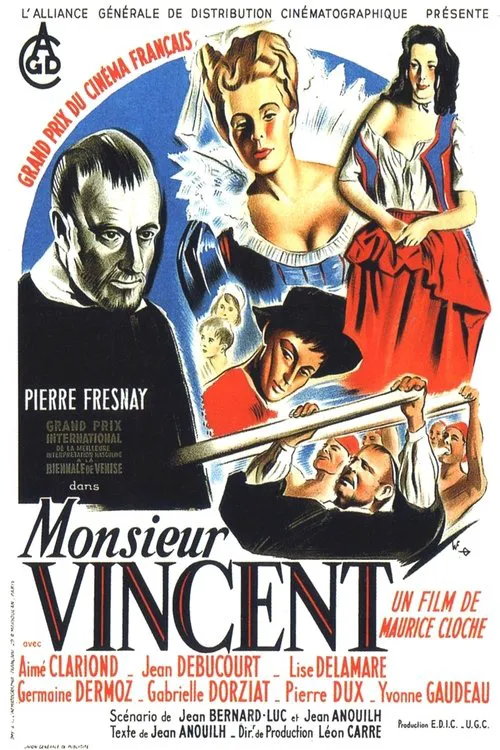Monsieur Vincent

Plot
Monsieur Vincent, a film directed by Maurice Cloche, is a biographical drama that tells the captivating story of Vincent de Paul, a devout French priest and social reformer who lived in the 17th century. The movie focuses on Vincent's selfless life, showcasing his extraordinary dedication to serving the underprivileged and his pivotal role in shaping the Catholic Church. Born in 1581 in the village of Pouy, in southern France, Vincent de Paul came from a humble family. His life took a dramatic turn when his mother contracted cancer, and he became emotionally closer to his mother, whose illness deepened his compassion for others. This initial life experience instilled in him the empathy and desire to help the sick and poor. Following in his family's footsteps, Vincent studied to become a priest. However, in those times, it was a common expectation for many young men to become clergy. Vincent's dedication and exceptional work ethic as a cleric earned the attention and respect of his peers and superiors within the Catholic Church. The film depicts how Vincent de Paul rose through the ranks within the Catholic Church to become one of its most revered clerics of the 17th century. It also emphasizes the crucial moments that shaped his spiritual journey and defined his ultimate purpose. His life was marked by intense contemplation and an increasing awareness of God's calling. Vincent came to realize the importance of self- denial and the need to dedicate his life to the service of others. Throughout the film, Maurice Cloche masterfully illustrates Vincent de Paul's unwavering commitment to his vocation as a priest and the establishment of two significant religious orders. These orders would not only bring spiritual guidance to the marginalized but also provide practical support and care to their needs. The film vividly portrays the lives of the people Vincent came into contact with, particularly those struggling with material poverty and spiritual destitution, as he tirelessly devoted himself to spreading the Word of God and addressing their social and emotional needs. As an early advocate of social reform and charitable initiatives, Vincent was instrumental in establishing the Daughters of Charity, alongside St. Louise de Marillac. Through this endeavor, the sisters were trained and equipped to provide aid, support, and education to thousands of underprivileged women, as well as orphans and abandoned children. The Daughters of Charity went on to become synonymous with compassion, kindness, and a resolute commitment to serve God through their service to society's most vulnerable members. One pivotal turning point occurred when Vincent encountered the wretched conditions of peasants in the countryside, particularly the lack of basic education that left them uninformed and vulnerable. This experience further strengthened his resolve to dedicate himself to improving their lives. He also founded the Congregation of the Mission, often known as the Vincentians, whose mission was to serve the spiritually deprived. This congregation aimed to bring the Word of God to those who lacked access to it, particularly in rural areas, and helped spread hope to those struggling in despair. In the film, Vincent's profound faith and compassion for the suffering are showcased through his unwavering perseverance in the face of adversity, including the disapproval and skepticism of his peers. His actions were guided by his unshakeable conviction that service to the poor and marginalized is a testament to one's devotion to Christ. As the years unfold in the biographical drama, Vincent de Paul's extraordinary character shines brighter through the struggles and triumphs he experiences. He faces opposition from within and outside the Church, as many struggle to understand his unorthodox methods and the audacity of his charitable endeavors. Despite such challenges, Vincent remains steadfast in his commitment to his vocation and continues to dedicate himself to the care and well-being of others. Throughout the movie, the cinematography skillfully evokes the atmosphere of the era, painting a vivid image of the social conditions of 17th-century France and the struggles of the people living in poverty. Vincent de Paul's remarkable story becomes an inspiring testament to the transformative power of faith, compassion, and resilience in the face of adversity. Ultimately, the life of Vincent de Paul is an unforgettable tribute to the transformative spirit of Christian love in action. His pioneering work and commitment to social reform continue to inspire countless individuals around the world, serving as a shining beacon of hope to those seeking to follow in his footsteps and dedicate themselves to the service of others. The film, Monsieur Vincent, beautifully captures the spirit and conviction of a man who, despite the limitations of his time, dared to challenge the status quo and challenge others to re-evaluate their priorities, leading them to adopt a more compassionate and inclusive approach to life. The movie leaves viewers with an enduring message that has the power to inspire audiences long after the credits roll – a reminder of the transformative potential that lies within us, awaiting expression and realization.
Reviews
Recommendations





